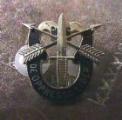Bahrain is a sneeze for the US; Saudi Arabia is the flu.
We ignore the sneeze to our peril.
But this is a great case study of the tremendous dilemma for the US in the greater Middle East. We have acted "consistently" across the region, in that we consistently act or don't act in places and manners hat we think will best serve our interests. That is fine to a degree, but becomes problematic when it takes a nation too far afield from their stated principles. This is doubly true for a nation so arrogantly verbose about the superiority of its principles to those of others, such as the US is. This is even more true when those principles include in a prominent manner the recognition of the right and duties of people everywhere to rise up in insurgency to form a government of their choosing when THEY believe the current government to be too out of touch with the people and un-reformable through legal means.
During the Cold War the US intentionally compromised some of our principles in order to create an effective scheme of Containment to thwart Soviet, and later Chinese, expansion of influence.
Some 22 years ago we did not see the end of the Cold War; no, we saw the collapse of the Soviet system of controls and externally focused national governments over the populaces of the states surrounding them as people, empowered by an emerging information age took advantages of conditions shaped by Western pressures and problems internal to Russia. That was the first boot hitting the floor.
Now in Arab Spring we finally hear the second boot hit. Finally the populaces of the greater Middle East, also empowered by far more sophisticated information technology are rising up to challenge the system set in place to contain the Soviets. Granted, US controls were far different than Soviet Controls; and Middle Eastern Despots are far more independent to act than their Eastern European counterparts.
Every conflict has two sides, we over focus on the other side. We were much quicker to roll back Cold War Containment measures in Europe and even Asia; but largely let it ride in the Middle East. The people there had no voice at that time, and the governments in power were happy to stay in power, so there was no change. Now the people have a voice, and change is happening.
The US needs to look at Arab Spring as a whole and understand it for what it is. If we do this right we will empower a new era of legitimacy of government and freedom of people across this region that will do far more to disempower AQ and similar organizations than any of the military operations of the past 10 years.
Too bad we're so internally focused on nonsensical political posturing over who will occupy the White House after the next election, all in the guise of fixing the economy. Our civilian leadership is earning an "F" on all counts. At home and abroad.











Bookmarks